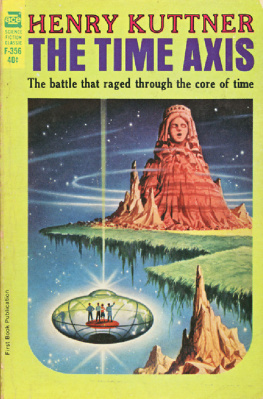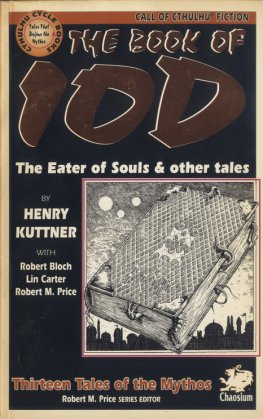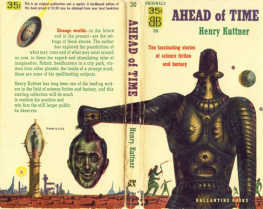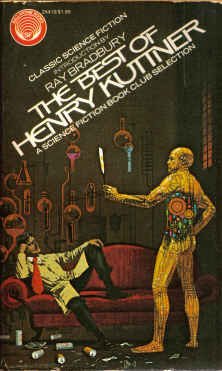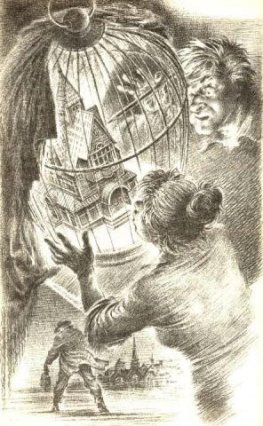Where the World is Quiet
by Henry Kuttner
Fra Rafael saw strange things, impossible things. Then there was the mystery of the seven young virginal girls of Huascan.
* * *
Fra Rafael drew the llama-wool blanket closer about his narrow shoulders, shivering in the cold wind that screamed down from Huascan. His face held great pain. I rose, walked to the door of the hut and peered through fog at the shadowy haunted lands that lifted toward the skythe Cordilleras that make a rampart along Peru's eastern border.
"There's nothing," I said. "Only the fog, Fra Rafael."
He made the sign of the cross on his breast. "It is the fog that brings thethe terror," he said. "I tell you, Seor White, I have seen strange things these last few monthsimpossible things. You are a scientist. Though we are not of the same religion, you also know that there are powers not of this earth."
I didn't answer, so he went on: "Three months ago it began, after the earthquake. A native girl disappeared. She was seen going into the mountains, toward Huascan along the Pass, and she did not come back. I sent men out to find her. They went up the Pass, found the fog grew thicker and thicker until they were blind and could see nothing. Fear came to them and they fled back down the mountain. A week later another girl vanished. We found her footprints."
"The same canyon?"
"Si, and the same result. Now seven girls have gone, one after the other, all in the same way. And I, Seor White" Fra Rafael's pale, tired face was sad as he glanced down at the stumps of his legs"I could not follow, as you see. Four years ago an avalanche crippled me. My bishop told me to return to Lima, but I prevailed on him to let me remain here for these natives are my people, Seor. They know and trust me. The loss of my legs has not altered that."
I nodded. "I can see the difficulty now, though."
"Exactly. I cannot go to Huascan and find out what has happened to the girls. The nativeswell, I chose four of the strongest and bravest and asked them to take me up the Pass. I thought that I could overcome their superstitions. But I was not successful."
"How far did you go?" I asked.
"A few miles, not more than that. The fog grew thicker, until we were blinded by it, and the way was dangerous. I could not make the men go on." Fra Rafael closed his eyes wearily. "They talked of old Inca gods and devilsManco Capac and Oello Huaco, the Children of the Sun. They are very much afraid, Seor White. They huddle together like sheep and believe that an ancient god has returned and is taking them away one by one. Andone by one they are taken."
"Only young girls," I mused. "And no coercion is used, apparently. What's up toward Huascan?"
"Nothing but wild llamas and the condors. And snow, cold, desolation. These are the Andes, my friend."
"Okay," I said. "It sounds interesting. As an anthropologist I owe it to the Foundation to investigate. Besides, I'm curious. Superficially, there is nothing very strange about the affair. Seven girls have disappeared in the unusually heavy fogs we've had ever since the earthquake. Nothing more."
I smiled at him. "However, I think I'll take a look around and see what's so attractive about Huascan."
"I shall pray for you," he said. "Perhapswell, Seor, for all the loss of my legs, I am not a weak man. I can stand much hardship. I can ride a burro."
"I don't doubt your willingness, Fra Rafael," I said. "But it's necessary to be practical. It's dangerous and it's cold up there. Your presence would only handicap me. Alone, I can go fasterremember, I don't know how far I'll have to travel."
The priest sighed. "I suppose you are right. When"
"Now. My burro's packed."
"Your porters?"
"They won't go," I said wryly. "They've been talking to your villagers. It doesn't matter. I'll go it alone." I put out my hand, and Fra Rafael gripped it strongly.
"Vaya con Dios," he said.
I went out into the bright Peruvian sunlight. The Indios were standing in straggling knots, pretending not to watch me. My porters were nowhere in evidence. I grinned, yelled a sardonic goodbye, and started to lead the burro toward the Pass.
The fog vanished as the sun rose, but it still lay in the mountain canyons toward the west. A condor circled against the sky. In the thin, sharp air the sound of a distant rock-fall was distinctly audible.
White Huascan towered far away. A shadow fell on me as I entered the Pass. The burro plodded on, patient and obedient. I felt a little chill; the fog began to thicken.
Yes, the Indios had talked to me. I knew their language, their old religion. Bastard descendants of the Incas, they still preserved a deep-rooted belief in the ancient gods of their ancient race, who had fallen with Huayna Capac, the Great Inca, a year before Pizarro came raging into Peru. I knew the Quichuathe old tongue of the mother raceand so I learned more than I might have otherwise.
Yet I had not learned much. The Indios said that something had come into the mountains near Huascan. They were willing to talk about it, but they knew little. They shrugged with apathetic fatalism. It called the young virgins, no doubt for a sacrifice. Quien sabe? Certainly the strange, thickening fog was not of this earth. Never before in the history of mankind had there been such a fog. It was, of course, the earthquake that had brought thethe Visitant. And it was folly to seek it out.
Well, I was an anthropologist and knew the value of even such slight clues as this. Moreover, my job for the Foundation was done. My specimens had been sent through to Callao by pack-train, and my notes were safe with Fra Rafael. Also, I was young and the lure of far places and their mysteries was hot in my blood. I hoped I'd find something oddeven dangerousat Huascan.
I was young. Therefore, somewhat of a fool....
The first night I camped in a little cave, sheltered from the wind and snug enough in my fleece-lined sleeping-bag. There were no insects at this height. It was impossible to make a fire for there was no wood. I worried a bit about the burro freezing in the night.
But he survived, and I repacked him the next morning with rather absurd cheerfulness. The fog was thick, yes, but not impenetrable.
There were tracks in the snow where the wind had not covered them. A girl had left the village the day before my arrival, which made my task all the easier. So I went up into that vast, desolate silence, the fog closing in steadily, getting thicker and thicker, the trail getting narrower until at last it was a mere track.
And then I was moving blind. I had to feel my way, step by step, leading the burro. Occasional tracks showed through the mist, showed that the native girl had walked swiftlyhad run in placesso I assumed that the fog was less dense when she had come by this way. As it happened, I was quite wrong about that....
We were on a narrow path above a gorge when I lost the burro. I heard a scrambling and clashing of hoofs on rock behind me. The rope jerked out of my hand and the animal cried out almost articulately as it went over. I stood frozen, pressing against the stone, listening to the sound of the burro's fall. Finally the distant noise died in a faint trickling of snow and gravel that faded into utter silence. So thick was the fog that I had seen nothing.
I felt my way back to where the path had crumbled and rotten rock had given way under the burro's weight. It was possible for me to retrace my steps, but I did not. I was sure that my destination could not be much further. A lightly clad native girl could not have gone so far as Huascan itself. No, probably that day I would reach my goal.
So I went on, feeling my way through the thick silent fog. I was able to see only a few inches ahead of me for hours. Then, abruptly the trail grew clearer. Until, at last I was moving in the shadowless, unearthly mist over hard-packed snow, following the clearly marked footprints of a girl's sandals.


